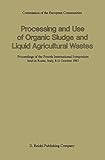Processing and use of organic sludge and liquid agricultural wastes: proceedings of the fourth international symposium held in Rome, 8-11 October 1985 [Libro electrónico] / editors: P. L'Hermite
L'Hermite, P [editor] | Commission of the European Communities. Environment Research Programme | Istituto di ricerca sulle acque Italy.
Tipo de material: Libro
en línea Editor: Dordrecht, The Netherlands: Kluwer Academic Publishers, c1986Descripción: xiii, 576 páginas : ilustraciones ; 24 centímetros.ISBN: 9027723389; 9789401086134; 9789400947566 (Online).Tema(s): Sewage sludge -- Congresses | Agricultural wastes -- Congresses | Organic wastes -- CongressesNota de acceso: Disponible para usuarios de ECOSUR con su clave de acceso Nota de bibliografía: Incluye bibliografía e índice Número de sistema: 57576Resumen:
Libro
en línea Editor: Dordrecht, The Netherlands: Kluwer Academic Publishers, c1986Descripción: xiii, 576 páginas : ilustraciones ; 24 centímetros.ISBN: 9027723389; 9789401086134; 9789400947566 (Online).Tema(s): Sewage sludge -- Congresses | Agricultural wastes -- Congresses | Organic wastes -- CongressesNota de acceso: Disponible para usuarios de ECOSUR con su clave de acceso Nota de bibliografía: Incluye bibliografía e índice Número de sistema: 57576Resumen:| Tipo de ítem | Biblioteca actual | Colección | Signatura | Estado | Fecha de vencimiento | Código de barras |
|---|---|---|---|---|---|---|
| Libros | Biblioteca Electrónica Recursos en línea (RE) | Acervo General | Recurso digital | ECO400575761736 |
Incluye bibliografía e índice
Disponible para usuarios de ECOSUR con su clave de acceso
Disposal of organic sludge and liquid agricultural wastes is a universal problem. Their production cannot be halted and as steps are taken to maintain or improve the quality of rivers and lakes it grows in quanti ty. The Commission's early awareness of the need for action to prepare for substantial growth in the Community's' sludge disposal problem led to the setting up of the COST 68 project to coordinate and guide European research and development work with particular emphasis on recycling sludge to agricultural land. Two years ago the field of research activi ties was extended to liquid agricultural wastes. This Symposium is the latest opportunity to provide a comprehensive review of the results of the project, to define current trends in practice and to establish by discussion the priorities for research over the next few years. The development of instrumentation and of analytical techniques during the period has extended our knowledge of the organic and inorganic constituents of sewage sludge and agricultural wastes and enabled us more readily to identify and measure the risks to which our general environment may be exposed when disposing of it. This evolution of understanding is a continuing process and an essential guide to the modification of disposal practices to achieve safer and more efficient operations. However, it is important to take a broad view of the application of research findings in the light of the considerable contrast in conditions in different parts of the world eng
Disponible en línea
Adobe Acrobat profesional 6.0 o superior
Subscripción a ELSEVIER 26 de diciembre del 2013
